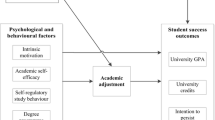Abstract
Most students of motivation for adult education in general, and post-secondary and higher education in particular, are preoccupied with motives from the standpoint of the individual learner. This article comprises an attempt to examine study motivations from the standpoint of societal expectations. The question raised is: to what degree do post-secondary and higher students take into consideration the collective needs (or ‘functional imperatives’) of their community, instead of, or rather in addition to, their individual aspirations? The question is examined by means of a multi-year statistical follow-up of post-secondary and higher Israeli kibbutz students and a pilot study of their study motives in a random sample. The findings tend to indicate that in micro-social community settings such as that of the kibbutz, individual aspirations in the sphere of post-secondary and higher education may be reconciled to a certain degree with societal needs and expectations.
Similar content being viewed by others
References
Bailey, Kenneth, D. (1978). Methods of Social Research. New York: The Free Press.
Boshier, Roger (1985). ‘Motivation for Adult Education. A Summary of Discussion.’ In J. H. Knoll (eded.), Motivation for Adult Education, 1985: 132–141.
Cohen, Erik (1983). ‘The Structural Transformation of the Kibbutz.’ In E. Krausz (ed.), The Sociology of the Kibbutz, 1983: 75–114.
Connidis, Ingrid (1983). ‘Integrating Qualitative and Quantitative Methods in Survey Research on Aging: An Assessment.’ Qualitative Sociology 6(4), 1983: 334–352.
Denzin, Norman, K. (ed.) (1978). Sociological Methods: A Sourcebook. New York: McGraw-Hill.
Gamson, Zelda (1975). ‘The Kibbutz and Higher Education: Cultures in Collision?’ Jewish Sociology and Social Research 2(1), 1975: 10–28.
Gamson, Zelda and Palgi, Michal (1982). ‘The “Over-Educated” Kibbutz: Shifting Relations Between Social Reproduction and Individual Development on the Kibbutz.’ Interchange 13(1), 1982: 55–67.
Knoll, Joachim, H. (ed.) (1985). Motivation for Adult Education. Bonn: German Commission for Unesco.
Krausz, Ernest (ed.) (1983). The Sociology of the Kibbutz. Vol. II of Studies of Israeli Society. Publication Series of the Israel Sociological Society. New Brunswick and London: Transaction Books.
Kulpinska, Jolanta (1985). ‘Some Remarks on the Present Student Generation.’ Higher Education in Europe 10(1), 1985: 30.
Leviatan, Uri (1982). ‘Higher Education in the Israeli Kibbutz: Revolution and Effect.’ Interchange 13(1), 1982: 68–82.
Palgi, Michal; Blasi, Joseph Raphael; Rosner, Menachem; Safir, Marilyn (eds.) (1983). Sexual Equality: The Israeli Kibbutz Tests the Theories. Norwood, Pa.: Norwood Editions.
Peisert, Hansgert (1985). ‘Students in the Federal Republic of Germany: Diversity in Motives and Prospects.’ Higher Education in Europe 10(1), 1985: 18–29.
Rosner, Menachem et al. (1978). The Second Generation: The Kibbutz between Continuity and Change. Tel Aviv: Sifriat Poalim. (Hebrew).
Rosner, Menachem (1981). ‘Kibbutz.’ Encyclopedia of Social Sciences. Vol. VI, 1981: 824–828. (Hebrew).
Shapira, Rina and Etzioni-Halevy, Hava (1973). Who Are You the Israeli Student? Tel Aviv: Am Oved. (Hebrew).
Shur, Shimon (1975). ‘The Kibbutz and the “Modernization Syndrome”: An Introduction.’ Hakibbutz, No. 2. The section in English, 1975: 260–262.
Shur, Shimon (1985). ‘A Preliminary Schema of a Sociology of Higher Education in the Kibbutz’. Ofkey Haskalah (Educational Horizons), No. 50, 1985: 64–76. (Hebrew).
Shur, Shimon (1985). ‘Higher Education and Federational Accounting.’ (A Statistical Follow-Up), Ofkey Haskalah (Educational Horizons), No. 50, 1985: 84–96. (Hebrew).
Talmon, Yonina (1970). Individual and Society in the Kibbutz. Sociological Research. Jerusalem: Magnes Press. (Hebrew).
Tiger, Lionel and Shepher, Joseph (1975). Women in the Kibbutz. New York: Harcourt, Brace, Jovanovich.
Webb, Eugene (1978). ‘Unconventionality, Triangulation and Inference.’ In: Denzin, M. Sociological Methods, 1978.
Author information
Authors and Affiliations
Additional information
The author is indebted to Prof. Menachem Rosner (University of Haifa, The Institute for Research of the Kibbutz and the Cooperative Idea) and to anonymous referees for their valuable comments on earlier versions of this paper. The author is also grateful to Mrs. Angela Greenson for typing the article.
Rights and permissions
About this article
Cite this article
Shur, S. Individualistic vs. collectivistic study motives: the case of Israeli kibbutz students. High Educ 18, 309–320 (1989). https://doi.org/10.1007/BF00138186
Issue Date:
DOI: https://doi.org/10.1007/BF00138186




